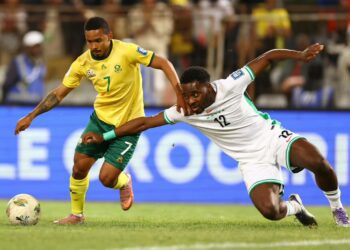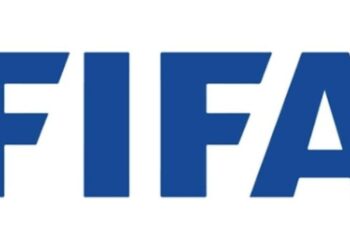Football is more than just a game in Spain; it is a deeply ingrained cultural phenomenon that evokes intense passion, regional pride, and historic rivalries. At the heart of this footballing culture lies La Liga, Spain’s premier professional football league and one of the most renowned sporting competitions in the world.
Since its inception in 1929, La Liga has evolved from a ten-team competition into a global powerhouse, producing some of the greatest players, clubs, and matches in football history. With a legacy that spans nearly a century, it has become a symbol of tactical brilliance, flair, and intense competition.
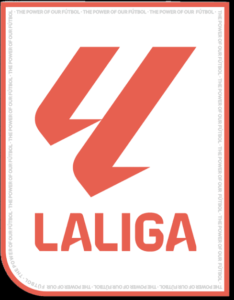
Beyond its sporting significance, La Liga plays a major economic and cultural role in Spain and beyond. It generates billions in revenue, employs thousands of people, and attracts millions of fans worldwide. Moreover, La Liga has significantly contributed to Spain’s dominance in European and international football, with its clubs frequently excelling in the UEFA Champions League and Europa League.
It is also the home of two of the most successful and widely followed football clubs in history, Real Madrid and FC Barcelona. The league has produced some of the most decorated and influential players ever to grace the game, from Alfredo Di Stéfano, Johan Cruyff, Diego Maradona, Zinedine Zidane, to Lionel Messi and Cristiano Ronaldo.
Beyond the glitz and glamour, La Liga is defined by intense rivalries, tactical evolution, financial battles, and global influence. The league’s journey from its humble beginnings to its present-day dominance in European football is a testament to Spain’s deep-rooted love for the sport, and one that is worth talking about.

Let’s get into it…
The Origins and Early Years of La Liga
The Birth of a National League (1928-1929)
Before the creation of La Liga, football in Spain was primarily regional, with clubs competing in local tournaments such as the Campeonato Regional and the Copa del Rey (a knockout tournament that determined Spain’s unofficial national champion). While the Copa del Rey was the most prestigious national competition, there was no official league system to determine the best team in Spain.
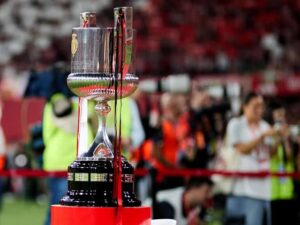
The idea of creating a national league came in 1928 when José María Acha, a director at Arenas Club de Getxo, suggested the formation of a unified football league in Spain, just like England’s Football League which had been operating since 1888. After lengthy discussions, the Spanish Football Federation approved it, and the inaugural Primera División (La Liga) season kicked off in 1929 with ten founding teams:
FC Barcelona
Real Madrid
Athletic Bilbao
Real Sociedad
Atlético Madrid (then Athletic Madrid)
RCD Espanyol
CE Europa
Real Unión
Arenas Club de Getxo
Racing Santander
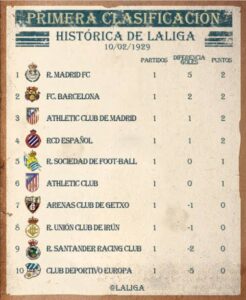
The first-ever La Liga champions were FC Barcelona, who edged out Real Madrid to win the title. However, Athletic Bilbao quickly became the dominant force of the 1930s, securing multiple league titles and playing an aggressive, attacking style of football.
La Liga Before the Civil War (1930s)
The early years of La Liga were characterized by Athletic Bilbao’s dominance, as they won four titles in the 1930s and became famous for their all-Basque policy, an attacking brand of football that saw them achieve the biggest-ever win in La Liga history, a 12-1 victory over FC Barcelona in 1931 and this style of football continues to this day.

However, Spanish football was soon disrupted by political turmoil. The outbreak of the Spanish Civil War (1936-1939) led to the suspension of the league, with many clubs and players deeply affected by the conflict. Football took a backseat as Spain endured one of the most turbulent periods in its history.
The Post-War Era and the rise of Real Madrid (1940s-1950s)
The 1940s saw several clubs competing for dominance, including Atlético Madrid, Valencia, and Sevilla. However, the 1950s marked the beginning of Real Madrid’s golden era, largely thanks to the arrival of Alfredo Di Stéfano in 1953.
Under the leadership of club president Santiago Bernabéu, Real Madrid revolutionized football by signing world-class players like Alfredo Di Stéfano and Francisco Gento. This investment paid off, as Madrid won four La Liga titles between 1954 and 1958 and became the most dominant club in European football, winning five consecutive European Cups from 1956 to 1960.
This period also saw the rise of FC Barcelona, led by Hungarian superstar László Kubala, who helped Barcelona win four league titles in the 1950s. This decade laid the foundation for the fierce rivalry between Barcelona and Real Madrid, known as El Clásico, which remains one of the most anticipated matches in world football today.
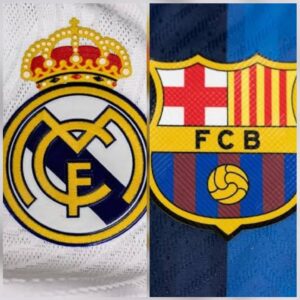
Tactical and Cultural Evolution in La Liga
The 1960s and 1970s
The 1960s and 1970s were largely dominated by Real Madrid, who won 14 La Liga titles in 16 seasons. Players like Paco Gento, Amancio Amaro, and Pirri established Real Madrid as the undisputed kings of Spanish football. However, Barcelona remained competitive, and clubs like Atlético Madrid and Valencia occasionally challenged Madrid’s supremacy.
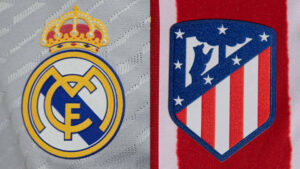
The 1960s also saw the emergence of two distinct footballing philosophies in La Liga:
Real Madrid’s dominant, attacking style, built around skillful and technically gifted players like Amancio Amaro and Pirri.
Barcelona’s possession-based approach, which would later influence Johan Cruyff’s tiki-taka philosophy in the 1990s.
The 1970s marked the arrival of Johan Cruyff, one of the most influential players in football history. His transfer to Barcelona in 1973 ignited a footballing revolution, and he led Barcelona to the 1973-74 La Liga title, their first in 14 years. Cruyff not only led Barcelona to the 1973-74 La Liga title but also introduced tactical ideas that would later transform football.
During the 1970s also, Atlético Madrid and Valencia briefly challenged the Real Madrid-Barcelona duopoly, with Atlético winning La Liga in 1973 and 1977, and Valencia securing the title in 1971.

The 1980s and 1990s
The 1980s saw the decline of Real Madrid’s total dominance as new teams emerged as title contenders. Real Sociedad (1981 and 1982) and Athletic Bilbao (1983 and 1984) won back-to-back titles, proving that La Liga was no longer just about Real Madrid and Barcelona.
However, Madrid bounced back with five consecutive titles from 1986 to 1990, led by their legendary “Quinta del Buitre” generation featuring Emilio Butragueño, Míchel, and Hugo Sánchez.
The 1990s belonged to Barcelona, thanks to Johan Cruyff’s Dream Team. Cruyff, now a coach, built a squad that included Pep Guardiola, Romário, Ronald Koeman, and Michael Laudrup, leading Barcelona to four straight La Liga titles from 1991 to 1994.
The Galácticos era of Real Madrid also began during this period, with Florentino Pérez’s ambition to bring in the best players in the world shaping a new chapter for the league.

Real Madrid and Barcelona continued to dominate into the late 1990s, signing world-class players like Ronaldo Nazário, Luís Figo, and Rivaldo which made La Liga even more glamorous.
La Liga’s Structure and Competition Format
League Format
La Liga operates as a private sports association comprising 20 clubs in the Primera División (LaLiga EA SPORTS) and 22 in the Segunda División (LaLiga HYPERMOTION). These clubs function as public limited sports companies, collectively responsible for organizing national professional football competitions in Spain. The league’s headquarters are situated in Madrid, with a global presence spanning 41 countries through 13 offices and 44 delegates.
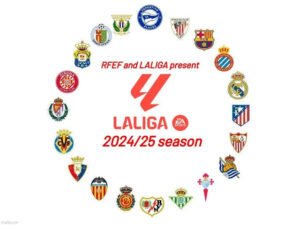
The League follows a double round-robin format, where each of the 20 teams plays 38 matches (home and away) in a season.
The season usually runs from August to May, with a winter break in December. The top four teams qualify for the UEFA Champions League, while the fifth and sixth-placed teams qualify for the UEFA Europa League.
The bottom three teams are relegated to Segunda División. They are replaced by the top two teams from Segunda División and the winner of a playoff tournament among the third to sixth-placed teams.
Most Successful Clubs in La Liga History
Real Madrid (35 titles)
FC Barcelona (27 titles)
Atlético Madrid (11 titles)
Athletic Bilbao (8 titles)
Valencia CF (6 titles)
The Impact of La Liga on European and International Football
Spanish clubs have historically been powerhouses in European competitions, frequently winning the UEFA Champions League, Europa League, and Super Cup.
Real Madrid has won a record 15 Champions League titles (as of 2025), making them the most successful club in the competition’s history.

Barcelona, with their peak years under Pep Guardiola, won four Champions League titles between 2006 and 2015, revolutionizing football with their tiki-taka style.
Sevilla has dominated the UEFA Europa League, winning a record seven titles, making them the most successful club in the tournament’s history.
La Liga’s influence extends to national team success as well. Spain’s golden generation (2008-2012), led by La Liga players like Xavi, Iniesta, Sergio Ramos, and David Villa, won back-to-back European Championships (2008 and 2012) and the FIFA World Cup (2010).
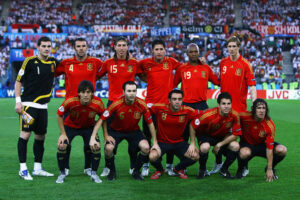
Recent Developments
La Liga has aggressively expanded its global footprint in recent years, securing broadcasting deals across North America, Asia, and Africa. The league has also invested in digital transformation, launching LaLigaTV and LaLigaTech to enhance viewer experience.
In 2021, La Liga secured a €2.7 billion deal with CVC Capital Partners, aimed at increasing its global market share and strengthening clubs financially.
In 2023, the league underwent a rebranding, replacing Banco Santander as title sponsor with Electronic Arts (EA SPORTS), resulting in the Primera División being renamed LaLiga EA SPORTS. This partnership led to the renaming of the Primera and Segunda Divisions to LaLiga EA SPORTS and LaLiga HYPERMOTION, respectively, starting from the 2023–24 season.
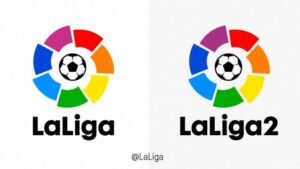
There have also been discussions about hosting La Liga matches in the USA, though these have faced resistance from FIFA and UEFA.

Challenges
Despite its success, La Liga faces several challenges, which includes;
Competition from the English Premier League, which generates higher revenues and attracts top players.
Financial struggles of Spanish clubs, particularly after the COVID-19 pandemic.
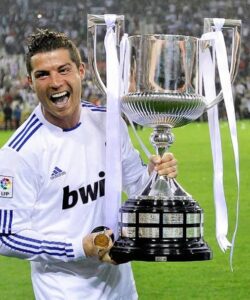
The departure of global superstars, such as Messi and Ronaldo, which has impacted the league’s marketability.
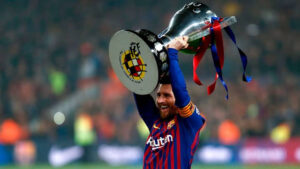
However, La Liga continues to evolve and adapt, investing in youth development, financial reforms, and global marketing strategies to maintain its status as one of the world’s premier football leagues.
Looking into the Future
La Liga’s journey from a small ten-team competition in 1929 to one of the most watched and respected football leagues in the world is a testament to Spain’s passion for the sport. With its rich history, tactical innovation, legendary players, and iconic clubs, La Liga remains a league that captivates fans worldwide.
As it moves into the future, La Liga will continue to shape global football, produce world-class talent, and create unforgettable moments for generations to come.

La Liga is continuously adapting to maintain its status as an elite football competition. Whether you support Real Madrid, Barcelona, Atlético Madrid, or a rising underdog like Osasuna, one thing is certain: La Liga delivers drama, skill, and passion like no other league.





